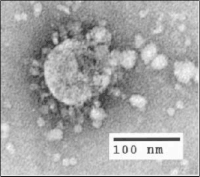
Antiviral activity of Sambucus FormosanaNakai ethanol extract and related phenolic acid constituents against human coronavirus NL63
Sign Up to like & getrecommendations! Published in 2019 at "Virus Research"
DOI: 10.1016/j.virusres.2019.197767
Abstract: Abstract Human coronavirus NL63 (HCoV-NL63), one of the main circulating HCoVs worldwide, causes respiratory tract illnesses like runny nose, cough, bronchiolitis and pneumonia. Recently, a severe respiratory illness outbreak of HCoV-NL63 has been reported in a… read more here.
Keywords: activity; ic50; ethanol extract; hcov nl63 ... See more keywords

Exploring the Spike-hACE 2 Residue–Residue Interaction in Human Coronaviruses SARS-CoV-2, SARS-CoV, and HCoV-NL63
Sign Up to like & getrecommendations! Published in 2022 at "Journal of Chemical Information and Modeling"
DOI: 10.1021/acs.jcim.1c01544
Abstract: Coronaviruses (CoVs) have been responsible for three major outbreaks since the beginning of the 21st century, and the emergence of the recent COVID-19 pandemic has resulted in considerable efforts to design new therapies against coronaviruses.… read more here.
Keywords: cov hcov; interaction; hcov nl63; hace ... See more keywords

Mouse models susceptible to HCoV-229E and HCoV-NL63 and cross protection from challenge with SARS-CoV-2
Sign Up to like & getrecommendations! Published in 2023 at "Proceedings of the National Academy of Sciences of the United States of America"
DOI: 10.1073/pnas.2202820120
Abstract: Significance Human coronavirus 229E(HCoV-229E) and NL63 (HCoV-NL63) are endemic worldwide and cause mild upper respiratory infections or occasionally, more severe lower respiratory tract infections. Mice are not permissive to these virus infections primarily because they… read more here.
Keywords: hcov nl63; hcov; mouse models; hcov 229e ... See more keywords

Human Air-Liquid-Interface Organotypic Airway Cultures Express Significantly More ACE2 Receptor Protein and Are More Susceptible to HCoV-NL63 Infection than Monolayer Cultures of Primary Respiratory Epithelial Cells
Sign Up to like & getrecommendations! Published in 2022 at "Microbiology Spectrum"
DOI: 10.1128/spectrum.01639-22
Abstract: HCoV-NL63 is widespread globally, accounting for a significant number of respiratory infections in children and adults. HCoV-NL63 gains entrance into respiratory epithelial cells via the ACE2 receptor, the same cell receptor used by severe acute… read more here.
Keywords: ace2 receptor; infection; hcov nl63; nl63 infection ... See more keywords

Development of a Whole-Virus ELISA for Serological Evaluation of Domestic Livestock as Possible Hosts of Human Coronavirus NL63
Sign Up to like & getrecommendations! Published in 2019 at "Viruses"
DOI: 10.3390/v11010043
Abstract: Known human coronaviruses are believed to have originated in animals and made use of intermediate hosts for transmission to humans. The intermediate hosts of most of the human coronaviruses are known, but not for HCoV-NL63.… read more here.
Keywords: livestock; domestic livestock; hcov nl63; immunofluorescence ... See more keywords